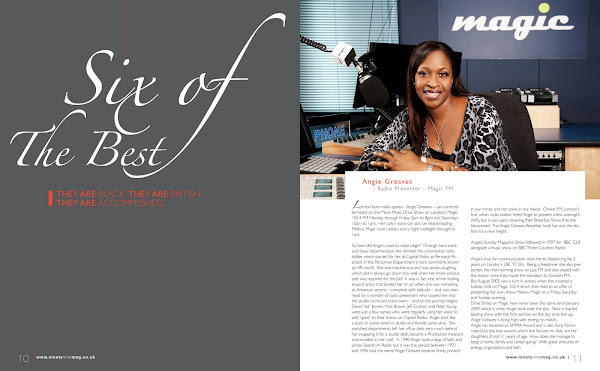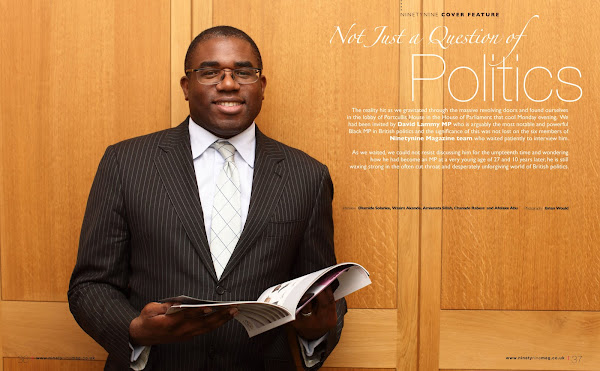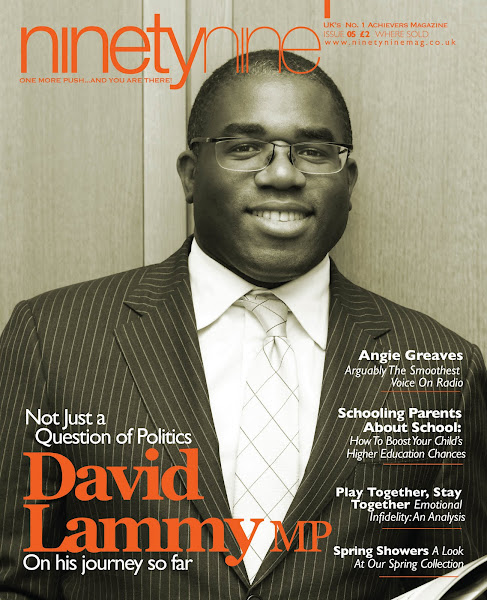"How To Boost Your Child's Higher Education Chances"
By Lola Akindele
(From the current issue of Ninetynine Magazine)
“If only I could of got a C in English yeah, then I would of been with dem guys innit...” These were the very words that stung my eardrums last week, as I sat on the tube reading and being disturbed by the unnecessarily loud chatter from three young black girls – no more than 18 years old - who seemed to find it a priority to ensure that their overbearing presence dominated the entire carriage.
These girls intrigued me to the core. The fact is, I didn’t so much care that they took it upon themselves to make such a loud clamour as they entered the tube; or that their preferred choice of revealing attire failed to uphold the notion of female dignity. Even the manner in which they spoke, (though in many cases, would cause certain individuals to look down upon them and brand them as a bunch of ‘youths, with no sense of social respectability’), was not a major issue for me.
There was something else about these girls that had me so captivated. Whilst such above mentioned issues of public conduct are no doubt important, their lack of realising (or caring about) this did not seem to grieve me as much as the actual initial statement made by the first girl, regarding her inability to have achieved a grade C in her English GCSE. This particular episode on the tube was a great eye opener for me. Besides realising just how much we can learn about the lives of our fellow commuters on the London Underground, it also confirmed that there is an immense sense of ignorance surrounding people’s perceptions of the British education system.
As a private tutor of almost eight years, I have many a time tutored individuals who had already taken their GCSEs and gone off to college but required tuition for their English GCSE retake. For within the British education system, despite having A Levels or any other post GCSE qualifications, individuals are simply refused entry into University without a minimum grade C for English and Maths at GCSE. And within my experience, it is evident that such a policy greatly affects many within the young black community.
It is common knowledge that the path of Higher Education and University is not the dream of everyone, neither is it the only means of becoming successful in life. However, we can’t deny that attending university and obtaining an effective degree, does have its benefits. And for those who do desire to go down this road at some point in their life, a good understanding of the British education system will be highly beneficial.
In 2005, there were twice as many black men in prison in the UK than in universities and now, five years later, this statistic still holds true. Fine. We’ve concluded that university isn’t for everyone but neither is prison and unless those within our black community can find a point of middle ground between the two institutions, then I’d rather opt for university than jail! In the USA today, a quarter of all black men within the entire nation, under the age of 26 are in jail. Within Britain, this is not the case as of yet, however, the situation could dramatically worsen if we (and especially parents of black children), do not educate themselves about the British education system. The high level of school exclusions, coupled with low academic achievement within the black community is not only disheartening for the students themselves but it also causes many teachers to refrain from pushing and motivating their students to aim higher and to do better .
A study conducted by Dr Steve Strand from Warwick University, found that many black children, particularly within the Caribbean community, were being academically held back in schools. The study showed that “After accounting for all measured factors, the under-representation is specific to this one ethnic group and indicates that, all other things being equal, for every three white British pupils entered for the higher tiers, only two black Caribbean pupils are entered.” With an abundance of negative press surrounding the Black British Community, every effort to display our positive achievements should no doubt be applauded. And one of these achievements lies within the education sector. There is no reason for young black students to be held back academically. However, not all schools within our country feel compelled to ensure that all of their students are given the best academic chances. The study found that within a majority of main stream schools, ‘teachers are routinely under-estimating the abilities of some black pupils, suggesting that assumptions about behavioural problems are overshadowing their academic talents.’
Secondary school pupils are put into sets for Maths, English, Science and Modern Languages. These sets thus reflect the student’s academic capabilities, ensuring that they are working within their levels of academic achievement. They also determine which GCSE Tiers students would be entered for. Before 2004, at GCSE there were: Higher Tier, Intermediate Tier and Foundation Tier. Students would be entered for Foundation Tier if their teachers felt they would not cope with sitting for the Higher Tier papers. This is the cause of many students being turned down by Universities, as the highest grade attainable with this paper (even if the student were to score 100%), would be a Grade D.
The survey was based on 15,000 pupils and concluded that low achievement among some black students was made worse because teachers didn’t expect them to succeed or feel the need to push their students to aim higher. Thus, many of the students felt no motivation from their teachers to want to push themselves either, believing that the lower tier option would mean less work anyway. Therefore, we witness many black students coming out of the British education system with at least a minimum of 5 GCSEs, all below a grade D. Although such qualifications would still allow them to go on to other post GCSE courses at college, they are automatically prohibited from applying for places at university.
Since 2004, the Intermediate Tier Paper has now been scrapped and the highest grade to be achieved at Foundation Tier has now increased from a Grade D to a Grade C. However, this has not resolved the issue. Obtaining a Grade C from the new Foundation Tier Paper will only happen if a student manages to score within the top percentile. Scoring beneath the 85% margin results in a Grade D or even worse! – Thus, the initial problem is not truly resolved. Many parents are unaware of the Tier system and children don’t recognise that the monitoring process for the Tier system begins at age 14 (which has replaced the Year 9 Key Stage 3 SATs).
It is highly important that parents are aware of how the British education system operates and it’s up to parents to strive to give their children every opportunity to aid them academically.
As for the young girl on the train, I hope she manages to get her English GCSE grade sorted – as well as her choice of revealing attire - but that’s for another day!







